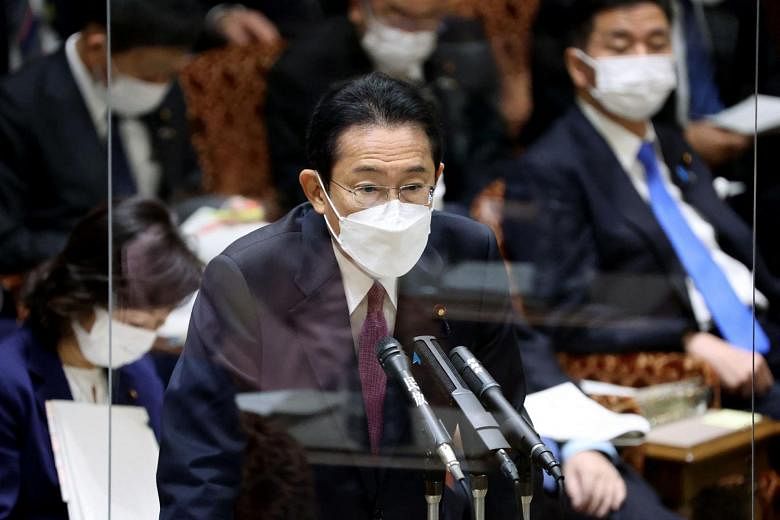TOKYO (BLOOMBERG) - Japan is set to unveil another record annual budget on Friday (Dec 24) as Prime Minister Fumio Kishida adds to the world's heaviest debt load with more spending ahead of an election next summer.
The budget for the year starting in April will increase to around 107.6 trillion yen (S$1.28 trillion), according to documents obtained by Bloomberg on Thursday that confirm earlier reports. The number represents a 0.9 per cent rise from the current year's initial spending plan, though final expenditure is typically inflated by extra budgets as the year goes on.
Tax income is expected to rise to a record 65.2 trillion yen, enabling the issuance of new bonds to be limited to 36.9 trillion yen, the documents show. The current fiscal year's initial budget required issuances of 43.6 trillion yen.
While the jump in forecast tax income indicates that the government's efforts to support households and firms during the pandemic has reduced the amount of scarring to the economy, the bond issuance shows Japan is still having to borrow more than a third of the funds it needs to pay for its annual spending. The official announcement of the figures is expected on Friday.
"While that would be a record budget, at this stage I think the finance ministry has managed to hold outlays down in relative terms," said Mr Yuichi Kodama, chief economist at Meiji Yasuda Research Institute. "The problem is that Japan's system allows for spending to balloon with its extra budgets, which aren't scrutinised as closely."
The annual budget will fund some of the spending for Mr Kishida's recent stimulus package of more than US$690 billion (S$940 billion) that aimed to shore up a recovery from Covid-19 that is now facing the challenge of the new Omicron variant.
Despite the spread of that variant in the United States and Europe, Japan has so far managed to avoid a major outbreak. While 73 per cent of new cases reported in the US were identified as Omicron last week, Japan has only breached the 100-case mark this week.
The combined spending is also aimed at setting the foundations for what the premier calls a new form of capitalism that distributes income more evenly and takes a longer-term perspective.
Mr Kishida faces another key election in the summer that will likely determine whether he stays on as prime minister or joins a long cast of one-year leaders in Japan. His success in dealing with Omicron and boosting the economy will likely be key factors in ensuring that the ruling coalition maintains its control of both houses of the legislature.
As the world moves towards its third year of the pandemic, Japan remains solidly in spending mode, with those calling for continued support still outnumbering those demanding immediate fiscal discipline.
Japan has the developed world's heaviest debt burden, with general government debt equating to 254.1 per cent of its GDP last year, according to the International Monetary Fund's calculations. Before Mr Kishida's recently announced package, the IMF was projecting that figure to rise to 256.9 per cent by the end of this year.
Even with the Bank of Japan holding down long-term interest rates around zero, the country's debt-servicing costs have hit a record of around 24.3 trillion yen, the document said. That equates to roughly 22.5 per cent of the initial budget. Only 13.4 per cent of Japanese government debt is held by foreigners, another factor that reduces the risk of getting into debt trouble.
Still, Japanese officials are keen to underline the government's commitment to reining in its budget deficit even if its own projections show the country is not expected to balance its budget this decade. The finance ministry is still clinging to its goal of balancing the books by fiscal 2025.

